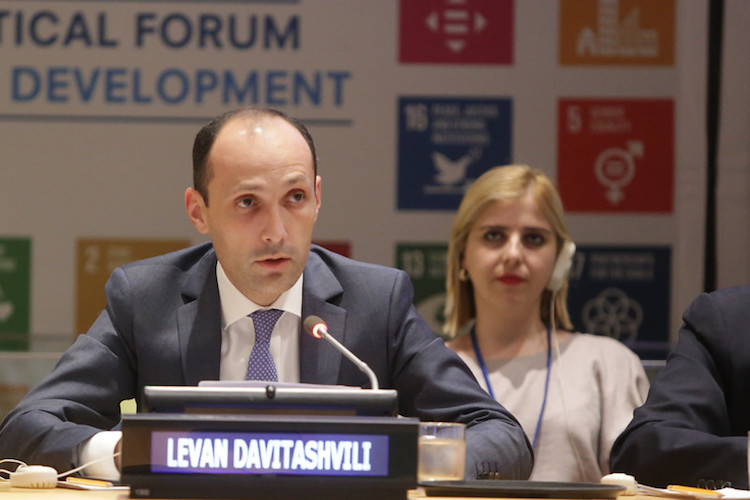By Ramesh Jaura
UNITED NATIONS (IDN) – The United Nations Economic and Social Commission for Asia and the Pacific (ESCAP) spanning an area home to 4.1 billion people, or two thirds of the world’s population, sprang a surprise when it admitted that at the current rate of progress in the region only one of the 17 Sustainable Development Goals (SDGs) – Goal 4 on achieving quality education and lifelong learning – is on track to be met by 2030.
This astonishingly forthright message was delivered at the 2018 High-level Political Forum (HLPF 2018) at the UN headquarters in New York on July 16 when participants were briefed on the outcomes of the Fifth Asia Pacific Forum on Sustainable Development (APFSD), held in Bangkok, from March 28-30, 2018 in preparation for the HLPF.
The Forum engaged member States, UN bodies, other international organizations, major groups and other stakeholders in highlighting regional and sub-regional perspectives on the theme of the high-level political forum in 2018, Transformation towards sustainable and resilient societies.
The Forum reviewed in depth the cluster of SDGs to be discussed at the HLPF 2018 – Goals 6 (clean water and sanitation), 7 (affordable and clean energy), 11 (sustainable cities and communities), 12 (responsible consumption and production), 15 (life on land) and 17 (partnership for the Goals) – as well as the inter-linkages within the cluster and with other Goals.
The gathering supported the presentation of voluntary national reviews and assessed the progress made with regard to the regional road map for implementing the 2030 Agenda for Sustainable Development in Asia and the Pacific.
The APFSD convened annually is the primary platform for countries, civil society and the UN to share achievements, challenges and opportunities arising from the 2030 Agenda.
However, ESCAP officials told participants that the Fifth APFSD had accentuated the need for increased engagement from all sectors of society, along with a whole of government approach as key to advancing the UN 2030 Agenda for Sustainable Development in the region
Comprising of 53 Member States and 9 Associate Members, ESCAP stretches from Turkey in the west to the Pacific island nation of Kiribati in the east, and from Russia in the north to New Zealand in the south.
APFSD Co-Chair Levan Davitashvili, Georgia’s Minister of Environment Protection and Agriculture, said in his report to the HLPF 2018: “In light of the complex risks facing the region, the Fifth APFSD stressed the importance of inclusive, multi-stakeholder participation, including by disadvantaged, poor, vulnerable and risk-exposed populations, and engagement by all levels of government.”
He added: “As many of our challenges from disasters to connectivity cut across boarders, Member States also reiterated the importance of regional cooperation for the implementation of the 2030 Agenda and the SDGs, and reaffirmed the key role of ESCAP in coordinating and supporting regional actions.”
ESCAP’s latest assessment shows only SDG 4 on achieving quality education and lifelong learning is on track to be met by 2030. Much to the regret of ESCAP experts, in several critical areas, including the health of the oceans, forest conservation and the reduction of greenhouse gas emissions, “the region is heading in the wrong direction”.
ESCAP’s Deputy Executive Secretary Kaveh Zahedi said on the sidelines of HLPF 2018: “Asia and the Pacific must step up its efforts to achieve the 2030 Agenda,” and added, “It is striking to see that despite a period of robust growth inequalities are widening, between and among countries, particularly in income, access to essential services, and exposure to natural disasters.”
“It is not all bad news, however,” ESCAP said in a media release. Asia-Pacific has seen welcome advancements over the past three years, including in some of its least developed countries. Healthier lives are being led and wellbeing has increased.
Besides, poverty levels are declining, albeit too slowly. Innovation is powering new industries and infrastructure, and the region’s track record in poverty reduction over the past few decades is unparalleled.
“Asia-Pacific may not be fully on track to achieve the 2030 Agenda yet, but the experience and dynamism of the region combined with its notable successes in reducing poverty levels over the past few decades, provides the perfect foundation for the transformations needed,” added Zahedi. [IDN-InDepthNews – 17 July 2018]
Photo credit: smugmug.com
IDN is flagship agency of the International Press Syndicate.
facebook.com/IDN.GoingDeeper – twitter.com/InDepthNews

